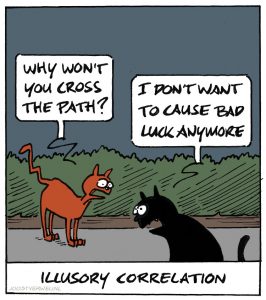I have a confession to make: I can’t stand detectives like Sherlock Holmes. He draws his conclusions much too fast:
“He knew she’s shortsighted because he observed some dents in the skin of her nose from a pair of glasses. Her boots are buttoned incorrectly, showing that she was in a hurry when she left the house. ” (Sherlock Holmes – A case of identity)”
Some may call this deductive reasoning, I call it illusory correlation: “ The phenomenon of perceiving a relationship between variables (typically people, events, or behaviors) even when no such relationship exists”.

Of course, you and me are no better than Sherlock Holmes. Our brains are wired to jump to conclusions without hardly anything to go on. As a child, we’ve learned to talk because we recognized patterns when other people were talking. We avoid a lot of risky behavior because we assume that it’s risky behavior, not because we’ve had the actual experience. Making assumptions is a fundemental part of our intelligence.
But making assumptions can also be a bad thing; assuming that some people cause bad luck for example. Such assumptions can damage society as a whole. Whodunnit? They did.
Studying users also means making assumptions what their intentions are. Influencing user behaviour means making assumptions how they’ll behave. So try not to be like Sherlock; check your assumptions and make sure you get some real experience in this world.